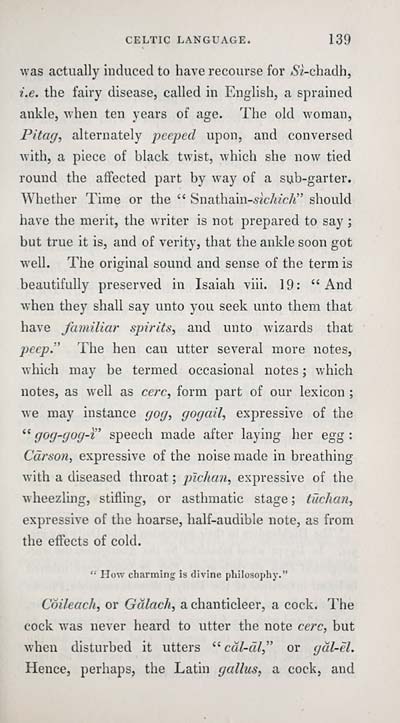Download files
Complete book:
Individual page:
Thumbnail gallery: Grid view | List view

CELTIC LANGUAGE. 139
was actually induced to have recourse for ASì-chadh,
i.e. the fau-y disease, called in Enghsh, a sprained
ankle, ^vhen ten years of age, The old woman,
PitcKj, alternately peeped upon, and conversed
with, a piece of black tvvist, which she now tied
round the afFected part by way of a sub-garter.
Whether Time or the " SxìaÙìam-sichich" should
have the merit, the writer is not prepared to say ;
but true it is, and of verity, that the ankle soon got
well. The original sound and sense of the term is
beautifully preserved in Isaiah viii. 19: " And
wheu they shall say unto you seek unto them that
have familiar spirits, and unto wizards that
peep." The hen can utter several more notes,
whicli may be termed occasional notes ; which
notes, as well as cerc, form part of our lexicon ;
we may instance goff, gogail, expressive of the
" 0^0~Qog-i^ speech made after laying her egg :
Càrson, expressive of the noise made in breathing
with a diseased throat ; plchan, expressive of the
wheezlmg, stifling, or asthmatic stage ; tùchan,
expressive of the hoarse, half-audible note, as from
the effects of cold.
" How charming ìs divine philosophy."
Còileach, or Gàlach, a chanticleer, a cock. The
cock was never heard to utter the note cerc, but
when disturbed it utters " càl-dl," or gàl-èl.
Hence, perhaps, the Latin gallus, a cock, and
was actually induced to have recourse for ASì-chadh,
i.e. the fau-y disease, called in Enghsh, a sprained
ankle, ^vhen ten years of age, The old woman,
PitcKj, alternately peeped upon, and conversed
with, a piece of black tvvist, which she now tied
round the afFected part by way of a sub-garter.
Whether Time or the " SxìaÙìam-sichich" should
have the merit, the writer is not prepared to say ;
but true it is, and of verity, that the ankle soon got
well. The original sound and sense of the term is
beautifully preserved in Isaiah viii. 19: " And
wheu they shall say unto you seek unto them that
have familiar spirits, and unto wizards that
peep." The hen can utter several more notes,
whicli may be termed occasional notes ; which
notes, as well as cerc, form part of our lexicon ;
we may instance goff, gogail, expressive of the
" 0^0~Qog-i^ speech made after laying her egg :
Càrson, expressive of the noise made in breathing
with a diseased throat ; plchan, expressive of the
wheezlmg, stifling, or asthmatic stage ; tùchan,
expressive of the hoarse, half-audible note, as from
the effects of cold.
" How charming ìs divine philosophy."
Còileach, or Gàlach, a chanticleer, a cock. The
cock was never heard to utter the note cerc, but
when disturbed it utters " càl-dl," or gàl-èl.
Hence, perhaps, the Latin gallus, a cock, and
Set display mode to: Large image | Transcription
Images and transcriptions on this page, including medium image downloads, may be used under the Creative Commons Attribution 4.0 International Licence unless otherwise stated. ![]()
| Early Gaelic Book Collections > Hew Morrison Collection > Adhamh agus Eubh, no Craobh Sheanachais nan Gàël > (269) |
|---|
| Permanent URL | https://digital.nls.uk/76900001 |
|---|
| Description | A selection of items from a collection of 320 volumes and 30 pamphlets of literary and religious works in Scottish Gaelic. From the personal library of Hew Morrison, the first City Librarian of Edinburgh. |
|---|
| Description | Selected items from five 'Special and Named Printed Collections'. Includes books in Gaelic and other Celtic languages, works about the Gaels, their languages, literature, culture and history. |
|---|

